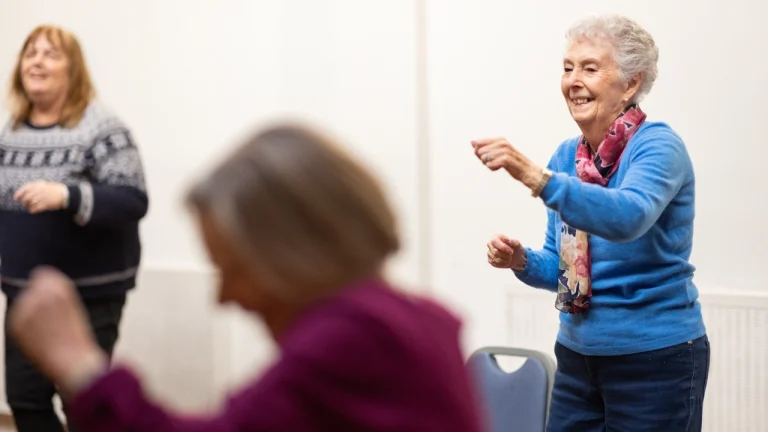Aging Well begins with small, consistent choices that strengthen your body, protect your mind, and lift your mood. As life changes—retirement, loss, new routines—you can build resilience, stay active, and keep purpose front-and-center.
Aging Well: Coping With Change
Change brings both stress and growth. To age well, practice skills that keep you steady when life shifts.
- Focus on gratitude. Make a brief daily list of what’s working—relationships, routines, or simple comforts.
- Acknowledge feelings. Naming sadness, fear, or anger reduces their power and prevents isolation.
- Accept what you can’t control. Redirect energy to your responses: boundaries, self-care, and practical next steps.
- Find the silver lining. Ask, “What can this teach me?” Growth-focused thinking boosts confidence.
- Act in small steps. Break down problems into the very next action—make a call, take a walk, book an appointment.
Laughter helps, too. Humor relaxes your body, eases tension, and restores perspective—vital ingredients for Aging Well.
Tip 2: Finding Meaning and Joy for Aging Well
Purpose protects health. When roles change, create new ones.
- Revive or start a hobby. Join a class, club, choir, or sports group to build skills and social ties.
- Learn something new. An instrument, language, or craft stimulates the brain and adds structure.
- Serve your community. Volunteering delivers meaning without the strain of full-time work.
- Enjoy nature and the arts. Walks, gardening, museums, concerts, and book groups nourish mood.
- Capture your story. Memoirs or family history projects turn experience into a legacy.
Aging Well: Staying Connected
Strong relationships are as protective as exercise.
- Schedule connection. Put weekly calls, coffees, or walks on the calendar.
- Make new friends (including younger ones). Fresh perspectives and energy matter.
- Prefer face-to-face time. Digital contact helps, but in-person time best buffers loneliness.
- Join support groups. During illness, grief, or major transitions, shared experience speeds healing.
- Keep showing up. A short visit or invite says, “You matter,” which supports Aging Well for everyone.
Aging Well: Get Active and Eat Well
Movement is the closest thing to a longevity “multivitamin.”
H3 — Build a sustainable exercise routine
- Clear it with your clinician. Tailor activity to conditions and medications.
- Start small, progress gradually. Ten minutes counts; add time and intensity over weeks.
- Walk often. Accessible, joint-friendly, and great for mood and sleep.
- Mix it up. Aim for cardio (walking, cycling), strength (2–3x/week), balance (tai chi), and flexibility.
H3 — Eat for steady energy
- Prioritize whole foods. Vegetables, fruit, legumes, whole grains, nuts, quality proteins.
- Cut back on added sugars and refined carbs. Stabilize energy, weight, and inflammation.
- Stay social at meals. Shared eating supports appetite, mood, and portion balance.
- Hydrate. Thirst signals can fade with age—sip water routinely.
Sleep and Recovery for Aging Well
Good sleep restores memory, mood, and immunity.
- Protect your sleep window. Regular bed/wake times anchor your body clock.
- Shape your space. Cool, dark, quiet room; supportive mattress or adjustable bed if needed.
- Power down screens an hour before bed. Reduce alerting blue light.
- Create a wind-down ritual. Bath, light stretching, reading, or calming music.
- Move by day, limit late caffeine. Daytime activity deepens nighttime sleep.
Aging Well: Keep Your Mind Sharp
Cognitive fitness grows with use—at any age.
H3 — Challenge your brain
- Progress difficulty. Harder crosswords, new recipes, different routes, fresh games.
- Learn real-world skills. Tech basics, photography, or financial literacy add confidence and independence.
H3 — Vary routines to build new pathways
- Switch hands for simple tasks. Brush teeth or open doors with the non-dominant hand.
- Rotate roles. Lead the club one month, take notes the next—novelty strengthens networks.
Safety, Mindset, and Medical Partnership
- Stay current on screenings and vaccines. Partner with your clinician to personalize care.
- Mind your mindset. Ditch myths like “decline is inevitable.” Many older adults thrive with better health habits than they had earlier in life.
- Stack small wins. A short walk, a call with a friend, or an early bedtime—all count toward Aging Well.
A Simple Weekly Plan (Template)
- Move: 150+ minutes moderate activity; 2–3 strength sessions; daily balance work.
- Eat: Half plate produce; whole grains; lean proteins; healthy fats.
- Sleep: 7–9 hours with a consistent routine.
- Connect: Two meaningful interactions; one group activity.
- Grow: 2–3 sessions of learning or skill practice.
- Reflect: 5-minute gratitude or journaling practice.

